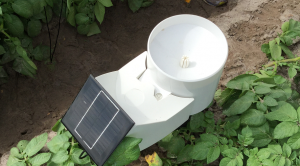Why use soil moisture sensors?
Farmers have to carefully manage water supply for their crops. Too much or too little irrigation can damage or stress the crop, making it more vulnerable to weed competition, insect pests, and/or disease. Additionally, good irrigation management is vital in conserving water and preventing fertilizer runoff and leaching. It can be very difficult to tell how much water is available underground for the crop’s roots. The amount of water in the soil and the length of time it is held there varies, depending on recent rainfall, temperature, humidity, soil type, and other factors. Additionally, plants may access different soil volumes and depths, depending on the extent of their root system. And a crop’s water requirements will vary, depending on its growth stage. For most annual crops grown in Florida, mid-stage growth will have the highest water demand (Kisekka et al. 2022). So there is no “set it and forget it” easy solution for managing irrigation.
How do sensors help?
Soil moisture sensors are a helpful tool for farmers, giving a glimpse below-ground to see how much water is available for their crops. Our sensors transmit data using cell phone antennas to provide near real-time information on the internet. Farmers can then monitor trends and adjust irrigation in response to current conditions. Moisture sensor probes collect data at different soil depths too. This allows farmers to see the soil layers in which plants take up water and the relative amounts of moisture available across the vertical soil profile.

Sensor Loaner-Trainer Program
Through grants from the Florida Department of Agriculture and Consumer Services, many UF/IFAS Extension Agents across the state are able to provide soil moisture sensors for growers to try out. Most of the units come with either 2- or 3-foot-long probes for in-ground production. A limited number of container-based production units are also available. After installing the sensors on participating farms, Extension Agents help the growers become familiar with the data and learn how to apply the information in adjusting their irrigation schedule. So far, 11 farmers and nursery growers in Martin and St. Lucie counties have participated in the loaner-trainer program. For more information or to participate in the loaner-trainer program in Martin County, please contact Yvette Goodiel. Elsewhere in Florida, reach out to your local UF/IFAS Extension office or Dr. Vivek Sharma, Assistant Professor, Precision Water Management and leader of the UF/IFAS Extension statewide soil moisture sensor loaner-trainer network.
 0
0
